Barak UpdatesBreaking NewsFeature Story
Chicago speech of Swami Vivekananda & timeless message for the world, writes Niharendu Dhar
A special write up on the 127th anniversary of Swami Vivekananda’s Chicago speech
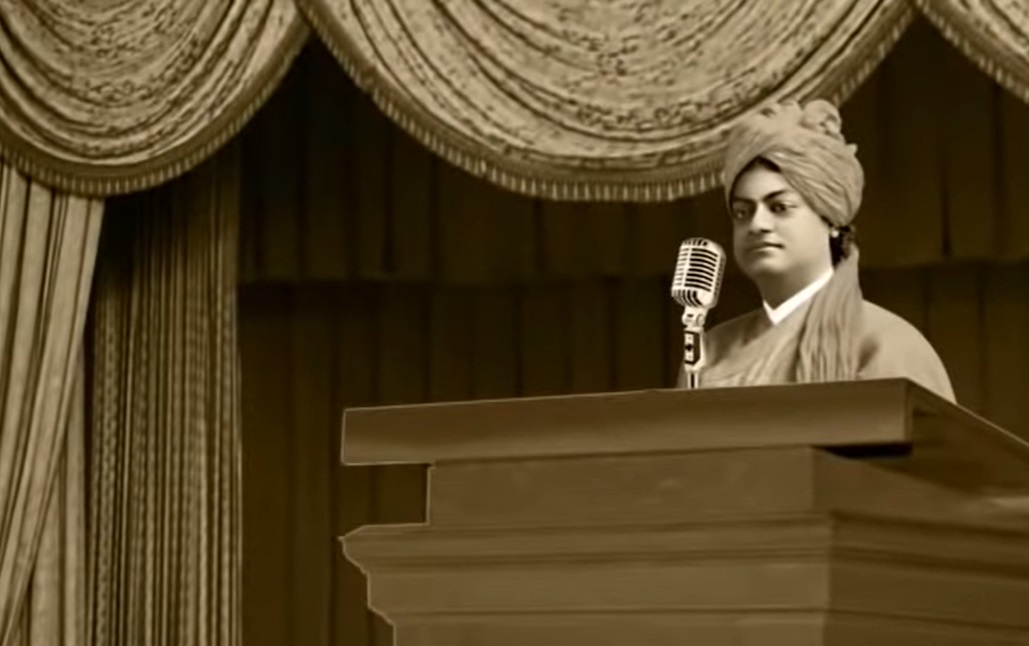
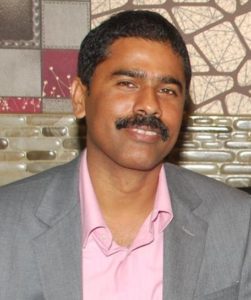
Sept. 11: Swami Vivekananda (1863-1902), a wandering Hindu monk, was instrumental in awakening nationalism in India and introducing Vedanta and Yoga to the West. He was among the first spiritual leaders in modern times to speak for the masses. Swami Vivekananda laid great stress on the divinity of human beings and advocated the idea of universality of religions. Vivekananda was the first person who went to the West and presented India from the Indian perspective. Prof. A.L. Basham, eminent historian and Indologist, described Swami Vivekananda as “One of the main moulders of the modern world.”
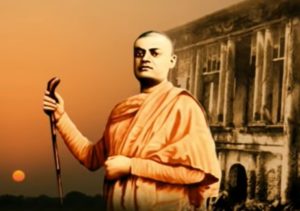 Vivekananda went to America in 1893 to attend the World Parliament of Religions, at a time when he was deeply pained by the plight of the average Indian under the colonial British regime. He had a first-hand assessment of situation in different parts of the country based on his extensive travel all over India. Vivekananda had a vision of making India the “JAGAT GURU”. And he was on a mission too—a mission to restore the lost glory of Mother India and to spread the eternal message of Vedanta to the Western World. Infact, his lectures in Chicago had been a game-changer- it changed the perception of the West about India in a big way and decisive way.
Vivekananda went to America in 1893 to attend the World Parliament of Religions, at a time when he was deeply pained by the plight of the average Indian under the colonial British regime. He had a first-hand assessment of situation in different parts of the country based on his extensive travel all over India. Vivekananda had a vision of making India the “JAGAT GURU”. And he was on a mission too—a mission to restore the lost glory of Mother India and to spread the eternal message of Vedanta to the Western World. Infact, his lectures in Chicago had been a game-changer- it changed the perception of the West about India in a big way and decisive way.
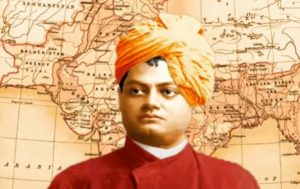 Vivekananda delivered six lectures in World’s Parliament of Religions during September, 1893, which we commonly call ‘Chicago Speeches’. Before attempting to analyse some of the major points on which he spoke in his famous Chicago Speeches, let us first make a note of the following things:
Vivekananda delivered six lectures in World’s Parliament of Religions during September, 1893, which we commonly call ‘Chicago Speeches’. Before attempting to analyse some of the major points on which he spoke in his famous Chicago Speeches, let us first make a note of the following things:
• Swami Vivekananda was a youth of thirty at the time of Chicago address
• He went their uninvited
• He had no previous experience of making public speeches.
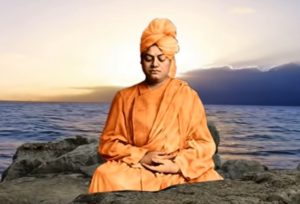 Obviously, when the day of reckoning came i.e. the opening day of World’s Parliament of Religions on 11 September, 1893, Vivekananda was visibly nervous and he requested the organisers to announce his name in the last part of the programme. It was a gathering of seven thousand people in the spacious hall of the Art Institute, Chicago. When his turn finally came, he mentally bowed down to Saraswati, the Goddess of learning and began his address with the words, “Sisters and Brothers of America”. Immediately, there were thunderous applause, which lasted for full two minutes. Evidently Swamiji was able to establish an instant connect with the audience by these heart touching words. According to American Novelist Christopher Isherwood, “When Vivekananda said, ‘Sisters and brothers’ he actually meant that he regarded the American women and men before him as sisters and brothers; the well-known operational phrase became simple truth.”
Obviously, when the day of reckoning came i.e. the opening day of World’s Parliament of Religions on 11 September, 1893, Vivekananda was visibly nervous and he requested the organisers to announce his name in the last part of the programme. It was a gathering of seven thousand people in the spacious hall of the Art Institute, Chicago. When his turn finally came, he mentally bowed down to Saraswati, the Goddess of learning and began his address with the words, “Sisters and Brothers of America”. Immediately, there were thunderous applause, which lasted for full two minutes. Evidently Swamiji was able to establish an instant connect with the audience by these heart touching words. According to American Novelist Christopher Isherwood, “When Vivekananda said, ‘Sisters and brothers’ he actually meant that he regarded the American women and men before him as sisters and brothers; the well-known operational phrase became simple truth.”
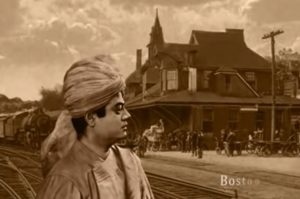 In his very first speech, Vivekananda emphasized on the idea of toleration, acceptance and universality of religions. He announced loudly,
In his very first speech, Vivekananda emphasized on the idea of toleration, acceptance and universality of religions. He announced loudly,
“I am proud to belong to a religion which has taught the world both tolerance and universal acceptance. We believe not only in Universal toleration, but we accept all religions as true”.
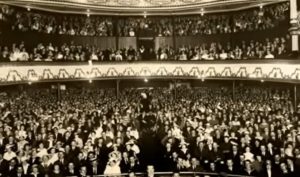 One cannot but admire not only the level of maturity and realization of the young sanyasin, but also his command over words, given the fact that he was speaking for the first time before such a huge and august gathering on a foreign soil. He was lucid and direct and there was no ambiguity in his statements. He went on to narrate the rich tradition of India in giving refuge to all those who were victims of social and religious intolerance and persecution. His words were prophetic and have relevance even today. Swamiji drew the attention of the large audience
One cannot but admire not only the level of maturity and realization of the young sanyasin, but also his command over words, given the fact that he was speaking for the first time before such a huge and august gathering on a foreign soil. He was lucid and direct and there was no ambiguity in his statements. He went on to narrate the rich tradition of India in giving refuge to all those who were victims of social and religious intolerance and persecution. His words were prophetic and have relevance even today. Swamiji drew the attention of the large audience
with the following statement:
“I am proud to belong to a nation which has sheltered the persecuted and the refugees of all religions and all nations of the earth. I am proud to tell you that we have gathered in our bosom the purest remnant of the Israelites, who came to Southern India and took refuge with us in the very year in which their holy temple was shattered to pieces by Roman tyranny. I am proud to belong to the religion which has sheltered and is still fostering the remnant of the great Zoroastrian nation”.
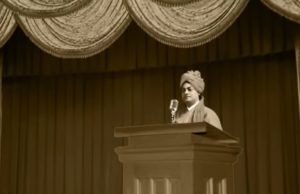 We are wonder struck to find how these words and ideas enunciated more than 125 years ago are still valid or have become increasingly relevant today. We all know that the current NDA Government has enacted the Citizenship Amendment Act (CAA) in December, 2019 in order to fast track citizenship rights to persecuted people of six minority communities from three neighbouring countries. It may not be an over statement to say that the above words of Swamiji might have acted as a guiding force behind the idea of bringing and adopting such a historical legislation.
We are wonder struck to find how these words and ideas enunciated more than 125 years ago are still valid or have become increasingly relevant today. We all know that the current NDA Government has enacted the Citizenship Amendment Act (CAA) in December, 2019 in order to fast track citizenship rights to persecuted people of six minority communities from three neighbouring countries. It may not be an over statement to say that the above words of Swamiji might have acted as a guiding force behind the idea of bringing and adopting such a historical legislation.
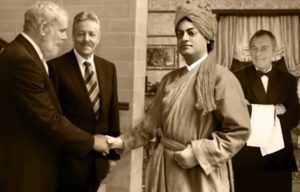 William James, famous Harvard Philosopher called Swami Vivekananda the “Paragon of Vedantists”. In fact Swamiji advocated the essence of Vedanta in his Chicago speeches and related it to contemporary circumstances. He stressed on the underlying unity amongst all religions and warned that “ … If anyone here hopes that this unity will come by the triumph of any one of the religions and the destruction of the others, to him I say, “Brother, yours is an impossible hope.”
William James, famous Harvard Philosopher called Swami Vivekananda the “Paragon of Vedantists”. In fact Swamiji advocated the essence of Vedanta in his Chicago speeches and related it to contemporary circumstances. He stressed on the underlying unity amongst all religions and warned that “ … If anyone here hopes that this unity will come by the triumph of any one of the religions and the destruction of the others, to him I say, “Brother, yours is an impossible hope.”
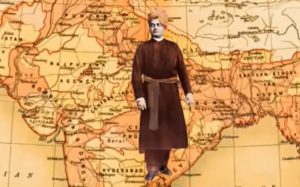 Swamiji was all against racism, fanaticism, bigotry and narrow mindedness. It is pertinent to point out here what he said on a different occasion, “If one religion be true, then all the others also must be true.” Swamiji was an eternal optimist and he never lost hope in the humanity, in the positive ideas and outlook of the people and the posterity. His last speech in the parliament of Religions on 27th September 1893 was a testimony to that. He concluded his speech with the following powerful words:
Swamiji was all against racism, fanaticism, bigotry and narrow mindedness. It is pertinent to point out here what he said on a different occasion, “If one religion be true, then all the others also must be true.” Swamiji was an eternal optimist and he never lost hope in the humanity, in the positive ideas and outlook of the people and the posterity. His last speech in the parliament of Religions on 27th September 1893 was a testimony to that. He concluded his speech with the following powerful words:
“In the face of this evidence, if anybody dreams of the exclusive survival of his own religion and the destruction of others, I pity him from the bottom of my heart and point out to him that upon the banner of every religion will soon be written, in spite of resistance : “ Help and not Fight, “ Assimilation and not Destruction” “ Harmony and Peace and not Dissension”.
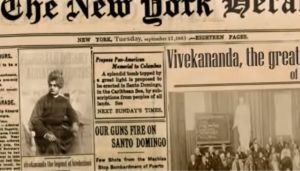 Through the Chicago speeches, Swamiji tried to impart messages, which are indeed timeless and extremely relevant in today’s context. After Swamiji’s deliberation in the World Parliament of Religions, a leading newspaper of America, ‘The Newyork Herald” wrote, “He is undoubtedly the greatest figure in the Parliament of Religions. After hearing him we feel how foolish it is to send missionaries to this learned nation”. According to Boston Evening Transcript, “Vivekananda’s address before the Parliament was broad as the heaven before us, embracing the best in all religions, as the ultimate universal religion-charity to all mankind and good works for the love of God, not for fear of punishment or hope of reward.”
Through the Chicago speeches, Swamiji tried to impart messages, which are indeed timeless and extremely relevant in today’s context. After Swamiji’s deliberation in the World Parliament of Religions, a leading newspaper of America, ‘The Newyork Herald” wrote, “He is undoubtedly the greatest figure in the Parliament of Religions. After hearing him we feel how foolish it is to send missionaries to this learned nation”. According to Boston Evening Transcript, “Vivekananda’s address before the Parliament was broad as the heaven before us, embracing the best in all religions, as the ultimate universal religion-charity to all mankind and good works for the love of God, not for fear of punishment or hope of reward.”
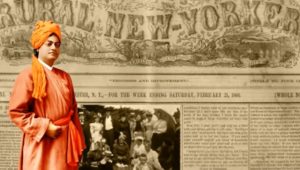 As the today’s world is suffering from the evils of unrest and widening divide due to religious or sectarian intolerance and a visible absence of communal harmony, Swamiji’s sermon of love, brotherhood, toleration and acceptance can act as a beaconing light to end strife and tension in the world. Let Swamiji enlighten us and show the path forever.
As the today’s world is suffering from the evils of unrest and widening divide due to religious or sectarian intolerance and a visible absence of communal harmony, Swamiji’s sermon of love, brotherhood, toleration and acceptance can act as a beaconing light to end strife and tension in the world. Let Swamiji enlighten us and show the path forever.





